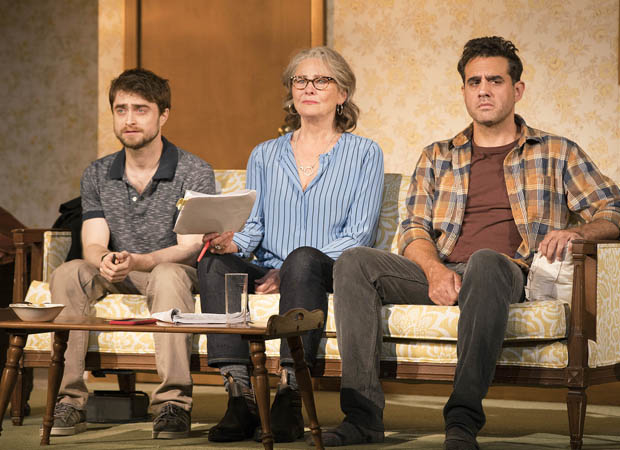Facts or Fake News: Portraying Journalism Onstage in the Trump Era
What is the lifespan of a fact when everyone is mad as hell?
Fact: Portrayals of journalists are taking center stage on Broadway this season.
In just shy of two months this past fall, The Lifespan of a Fact, which follows the battle for accuracy between a fact checker and an essayist, and Network, an adaptation of Paddy Chayefsky's 1976 satire about how far a fictional television station will go for good ratings, opened 10 blocks apart. This April, Ink, a look at the rise of media mogul Rupert Murdoch, will play the Samuel J. Friedman Theatre, just an avenue away from the headquarters of Murdoch's Fox News channel.
Fact: These plays were conceived of long before Komrade Cheetoface popularized the phrase "fake news." Each one has been at least a decade in the making.
Fact: These three works are making their New York debuts as verbal assaults on journalists steadily increase, reporters continue to lose their lives in senseless acts of violence, and viewers struggle to sort facts from fictions in the 24-hour news cycle. Broadway is responding by holding the mirror up now more than ever.

(© Peter Cunningham)
Fact vs. Fiction
"The whole experience of working on The Lifespan of a Fact," director Leigh Silverman says, "feels abundantly relevant and shockingly relevant and hilariously relevant, unfortunately slash fortunately."
Written by Jeremy Kareken, David Murrell, and Gordon Farrell, Lifespan is based on the circuitous journey of a 2003 essay written by John D'Agata. Commissioned and eventually turned down by Harper's, the essay wasn't actually printed until 2010, when The Believer gave it a thorough fact-checking by recent Harvard grad Jim Fingal. The sometimes-quarrelsome correspondence between D'Agata and Fingal forms the basis of a 2012 book that combines essay and notes, which in turn inspired the stage adaptation.
As a play text, Lifespan is in the tradition of works like God of Carnage. Silverman points out that the script doesn't really delve too deeply into character; instead, it the presents the development of a multifaceted, constantly unraveling argument about the virtues of the truth as it applies to journalism, storytelling, and the world at large. "It gives audience members the opportunity to both cathartically and entertainingly think about these things from a different point of view, which is really exciting."
In fact, one of the things Silverman hears most from audience members after the show — and what confirmed her suspicions that the piece would both entertain and challenge viewers — "is that people come in feeling like they're going to be on one side, and then they start to switch sides. The muscular debate makes people lean into the side of the argument that they were sure they would never be on. That is quite gratifying, and the sort of athletic, intellectual tennis match that I dreamed would happen."

(© Jan Versweyveld)
Fiction vs. Fact
A similar tournament is taking place in Network, where playwright Lee Hall had long wanted to write a script "about the corporate nature of how we interface with the world," he says. "Then it occurred to me that Paddy Chayefsky had written that."
Network, which hit cinemas in 1976, finds a veteran news anchor, Howard Beale, being forced into retirement when his ratings dip too low. After threatening suicide live on the air, Howard's audience numbers start to soar. But his stunt is taken to dangerous extremes when ambitious entertainment producer Diana Christensen starts engineering Howard as a prophet for a generation of people who are "mad as hell."
The parallels to real-life politicians and their rallying cries are ever-present in Ivo van Hove's bells-and-whistles production, which debuted this time last year at London's National Theatre. Audience members are encouraged to scream about how "mad as hell" they are, and cheer and clap along at Howard's rise and fall. "It's strange and unsettling to watch," Hall says. "Are you supposed to be clapping at that, or are you being told to? Are we being manipulated? How much are we complicit?"
On a purely page-driven level, the relevance of the text itself has shocked Hall throughout the process. "By the time we did it in London, it was like Paddy had been clairvoyant," he explains. "What he was writing about was day-by-day coming true." References to Russian meddling and the Saudi finances earn knowing laughs from audiences even though they were first penned 40 years ago.
There was one obvious change between film and stage property, and that was the way Network handles terrorism. "Paddy was poking fun of what he perceived as the self-serving nature of radical ideas," Hall explains. "The film ends in a very dark place because of it, even though Paddy was writing a satire. [To us now], this is actually documentary realism. Certainly in New York, we could not not take terrorism seriously. A lot of the things that seemed absurd to an audience in 1976 seem a lot less absurd now."

(© Marc Brenner)
Facts? Or fiction?
At the same time, across the Thames, playwright James Graham was having an out-of-body experience. Graham's drama Ink, about media mogul Rupert Murdoch's rise to power as the owner of the fledgling London tabloid The Sun, was playing on the West End after an acclaimed engagement at the Almeida Theatre. After weeks of greeting his associates and colleagues, Murdoch actually went to see it and showed up backstage one day. "Completely surreal" is how Graham describes it.
The story of The Sun's rise had interested Graham for a decade. So had the "emergence of populist rhetoric in political figures across America and across Europe. It felt right to use this story as a vessel to interrogate how populism has been fueled through our media, newspapers, and news, since The Sun is the template for all modern tabloids and for all populist rhetoric in our modern discourse. They were the first ones to really embrace giving people what they want, even if it's ugly."
Of course, a lot happened between when he started writing and when it premiered in the summer of 2017. "The culture wars had become very apparent between left and right, cities and rural districts, working and middle class," Graham notes. "People debate, as I'm sure they do with Trump, whether or not the Referendum created these divisions or just exposed them, but it was definitely a different climate than the one I was writing in. It felt like the mood of the country was incredibly angry."
While Graham insisted on being fair and balanced in his writing — "It's dramatically inert to blame one side and demonize them," he says — he was afraid that audience members would be out for "blood from Murdoch for stoking a lot of the hate that we're now dealing with. I was fearful that people wanted revenge, but in the end, to my surprise and relief, even a very progressive liberal audience was happy to go along with the ride of a newspaper empire, with characters that occupy the opposite end of the political spectrum."
As for the encounter with Murdoch himself, Graham explains that it was entirely cordial. He did have a few questions for the playwright, though, "about where some of my research came from. I started to think maybe he'd go off and check."
Sometimes even fictionalizing factual events has you second-guessing.







